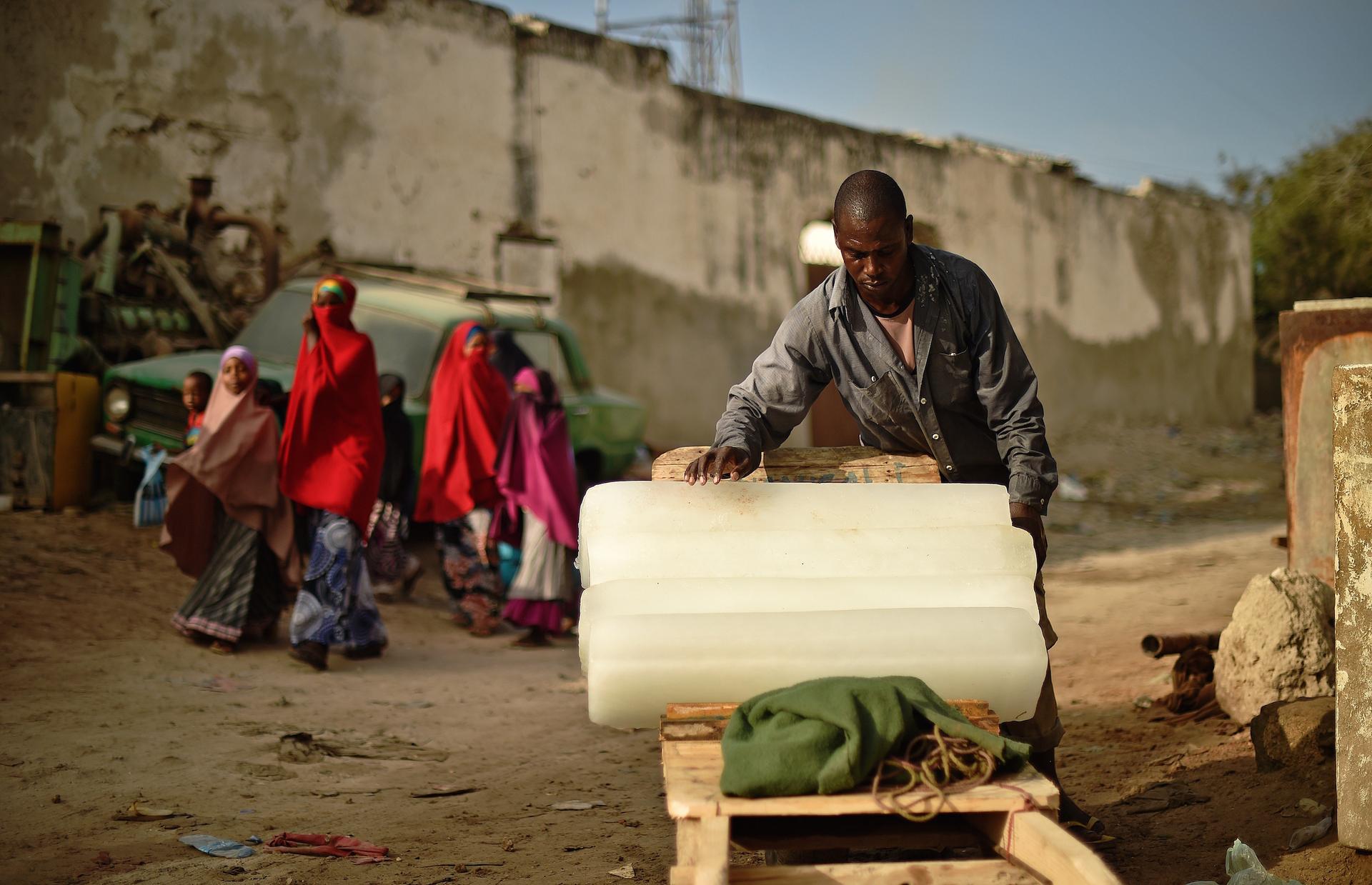‘Mogadishu used to be hell. Now it’s coming back to life’
A man loads blocks of ice onto a cart in Mogadishu on March 26, 2015.
MOGADISHU, Somalia — Streetlights now line this city’s main street, Mecca Avenue. Kids run around, weaving between food stalls, free-range chickens and mangy dogs. Record stores play loud music out of speakers, advertising their selections.
Residents stand in lines at local banks. Pharmacies, butchers, restaurants, grocery stores and mobile phone shops abound. Traders who have trekked into the city from the countryside carry baggage filled with goods to sell at street markets. At the end of the day, they fill their bags with goods to sell back home. Everywhere, new buildings are under construction.
“It’s hard to believe that Mogadishu is safe,” said Halima Haji, the owner of a little grocery shop. “Businesses are doing well here, and we make a lot of profit. People walk freely along the streets without fear of attack.”
Not very long ago, Mogadishu was different.
After Somalia’s central government collapsed in the early 1990s, civil war gripped the country. In 2006, the Al Qaeda-affiliated militant group Al Shabaab arrived on the scene, seizing cities throughout the country and occupying neighborhoods in the capital. In 2010, a famine struck that lasted for two years, adding more chaos to the mix.
But in 2011, Somali and African Union troops pushed Al Shabaab out of Mogadishu. Today, those security forces remain, keeping the peace.
“Al Shabaab is a weakened organization that attacks where it sees opportunities,” said Neil Wigan, an ex-British ambassador to Somalia. “Somalia is fully under the control of government forces and African Union troops. It’s a safe place right now.”
The East African nation now has a stable government under President Hassan Sheikh Mohamud, who claims to be setting up government institutions and reforming one of the most corrupt countries in the world.
While Mohamud has little sway in Somaliland, a northwest region of Somalia that has declared independence, and the autonomous region of Puntland in the northeast, the central government is consolidating its power in the capital with the peacekeeping forces’ help.
African Union forces have largely kept Al Shabaab out of the capital, erected fortifications to repel the Islamists’ assaults and killed or apprehended many of the group’s leaders, experts say. Troops are commonly stationed at hotels, banks and government offices.
“Al Shabaab has been driven out of the city and have lost a number of key operatives due to expanded military presence in Mogadishu,” said Nazlin Umar Fazaldin Rajput, national chairperson of the National Muslim Council of Kenya and a close observer of Islamic extremism in the Horn of Africa.
'It used to be hell'
To be sure, an American or European strolling alone on the streets of the city would likely encounter unfriendly, potentially armed men. But locals and accompanied outsiders enjoy a sense of security.
“It’s now safe in Mogadishu for us who were born and partly raised here,” said Basra Mohammad, 29, a business consultant who moved back to the city from Nairobi in 2013. “It used to be a hell. I ran to seek refuge in Kenya. But now security has improved and Mogadishu is coming back to life.”
More from GlobalPost: Destination Mogadishu
Basic city services have come back online. Schools are open. Children’s soccer academies are open. Trash collection, fire departments, electrical power and other municipal services are up and running.
“Enrollment for children attending schools has tripled since last year,” said Hassan Ahmed, 38, a teacher at Hamar Jajab Primary School. “We’ve so many people coming to the city to seek education and better their future. They feel secure while studying here.”
Al Shabaab remains a major problem in rural Somalia, and the militants still often stage attacks in Mogadishu. The terror group claimed responsibility for a July 26 attack at the Jazeera Palace Hotel in Mogadishu involving a bomb-filled vehicle that killed 15 people, for example.
But, compared to the worst years of the past decade, the July 26 attack was minor, said residents.
“Mogadishu has really changed when I compare it to how it used to be before I fled to London,” said Abdirahman Khalif, an assistant at a food wholesaler who emigrated to Britain around 2006 and returned to Mogadishu in 2012. “Life was not precious during that time. There was fighting everywhere. Guns rocked the air. People could be killed like cockroaches by Al Shabaab. But it’s now safe.”
Back to the 80s
Al Shabaab’s most recent attacks highlight the terror group’s desperation, said Capt. Mohamed Hussein of the Mogadishu police department. He noted that the July 26 explosion targeted foreign diplomatic missions in the hotel. The Islamists don’t want to see Somalia rejoining international community, he said.
“We’ve weakened them [Al Shabaab],” Hussein said. “They’ve no place in Somalia. What they are trying to do by attacking unarmed civilians is a sign of a weakened adversary seeking fame.”
Khalif returned to take part in his native country’s transformation. He hoped other Somalis from abroad would return.
“We need them to come and invest here,” he said. “Mogadishu is now becoming an economic hub. There are gas stations and supermarkets everywhere. There are more than 20 new radio stations operating in the country.”
Lifelong Mogadishu resident Basra Mohammad hopes her hometown can become one of the beautiful cities in Africa — as it was in the 1970s and early 1980s, before the central government imploded.
“The government is building and renovating houses and other structures across Mogadishu,” she said. “It’s going to be a developed city, because Mogadishu is now a peaceful place.”
Our coverage reaches millions each week, but only a small fraction of listeners contribute to sustain our program. We still need 224 more people to donate $100 or $10/monthly to unlock our $67,000 match. Will you help us get there today?
